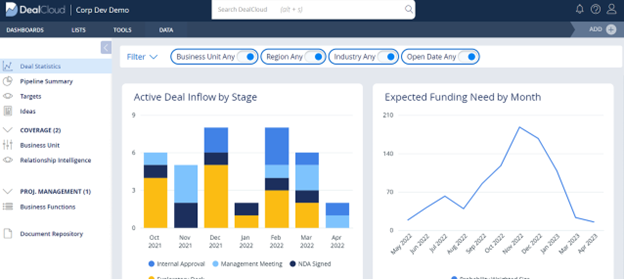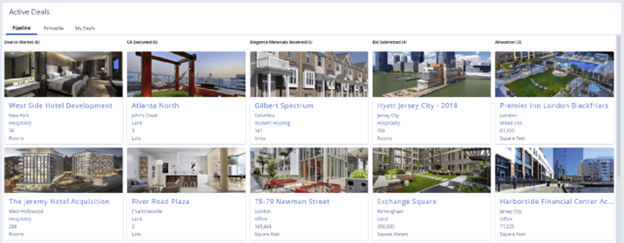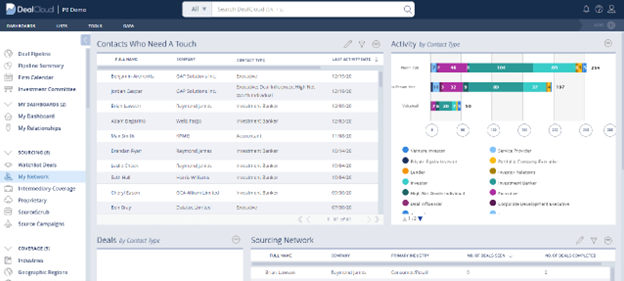Numbers don’t lie: Today’s capital market is the fastest and highest bidder’s world. According to McKinsey’s 2022 Private Markets Annual Review, dealmakers raised almost $1.2 trillion and invested $3.5 trillion in 2021 alone. Firms want to be the first to hear about the next best deal and snatch up every opportunity before their competitors do.
As a dealmaker in this hyper-competitive field, visibility into acquisition targets, capital raises, and ongoing deals is non-negotiable. To stay ahead of industry peers and manage relationships better, here are four types of dashboards for capital market dealmakers you should explore.
Private company monitoring dashboards
A private company monitoring dashboard shows deal inflow at any stage in the pipeline — whether it’s internal approval, a management meeting, or signing the NDA. You’ll also see the weighted probability of your firm’s expected required funding by month, which you can use to inform upcoming fundraising rounds.
To get a more granular view, filter and explore acquisition targets by business unit, region, industry, open date, and other key factors. By looking at your private company monitoring dashboard, you’ll be able to:
- Assess historical data on privately owned companies in your pipeline
- Determine if those companies are worth buying into or ready to be sold for a return
- Choose when and how to go about buying or selling the companies
To successfully buy private companies and expand your firm’s portfolio, you need a single source of truth for relationship data. Without this relationship intelligence, you’ll waste time searching for potential deal information.
Progress Software, for example, previously used spreadsheets for deal flow management, but found that this method was ineffective. To the satisfaction of its board and executive team, the firm switched to DealCloud to manage deal activity and reporting. The platform’s private company monitoring dashboards provides Progress with access to real-time opportunity data, allowing teams to easily navigate old, new, and potential deals, and make decisions at a high level and on a day-to-day basis.
“[We can decide] which companies we want to reach out to, which companies we had a dialogue with, and which companies could move down the funnel into potentially being prime mergers and acquisition (M&A) targets for us,” said Jeremy Segal, Executive Vice President of Corporate Development at Progress. “By using the DealCloud technology, we’re better able to manage and keep track of all our deal flow. We use DealCloud to do weekly check-ins and really get a good feel for the different activity that we have from an M&A standpoint.”

A private company monitoring dashboard on DealCloud
Source: DealCloud
Active deal dashboards
Active deal dashboards display deals in the market as well as those that your firm has executed, allocated, bid on, or begun due diligence for. The dashboard includes details like property images and size, region, and industry.
When making capital calls to purchase assets, it’s important to have dashboards that drill down into the details of active deals. Whether you’re on the road or in the office, having a comprehensive view of this information lets you create detailed pipeline reports to reference during capital calls.
Commercial real estate (CRE) professionals at Balfour Pacific scout properties day in and day out. For the firm’s team, seeing property images aids in quick decision-making.

An active deal dashboard for CRE professionals on DealCloud Source: DealCloud
“We look at 400 or more properties a year,” said Paola Yawney, Head of Business Development at Balfour Pacific. “At some point, it all gets blurry … Having that ability to look at the photograph and say, ‘Ah, I remember that one,’ is a key strength. It really allows us to act, move, and decide quickly.”
Active deal dashboards on DealCloud support Balfour Pacific’s deal evaluation and investor relations (IR) process. “We have a centralized repository for a lot of the marketing documents we draw on as we’re evaluating a deal,” said Yawney. “We’re based in Canada and investing in the U.S., [but] our investors require more information and disclosure. Having all that in one place is a really powerful thing.”
In addition to helping Balfour Pacific assess properties and determine prime acquisition targets, active deal dashboards help the firm focus on buying. “I use the [DealCloud] mobile app when we’re capital-raising,” said Yawney. “I’ve actually created dashboards … for our partners that are on the road, and I can arrange it so [they can view] the status of every transaction or capital raise, key action items, and correspondence.”
The in-depth insight the DealCloud dashboards provide keeps Yawney’s entire team aware of each deal’s status. “We typically pivot from deal information to Google Maps, and from the photo of the asset to documents we’ve uploaded,” she said. “It just gives everybody a visual of what’s going on with every deal.”
To populate the firm’s dashboards and make them more relevant, Yawney uses DealCloud’s Microsoft Outlook integration. The email add-in allows her and her team to track emails, documents, and calendar events in DealCloud.
Intermediary relationship dashboards
DealCloud’s intermediary relationship dashboard lets you view contact names, their companies and roles, and the last activity date. You can view from whom and where opportunities originated within a specific time range, helping you recognize which relationships are most relevant to you and which ones you should focus on maintaining. You’ll also identify the contacts you haven’t talked to in a while, allowing you to easily rekindle old connections.
Additionally, you’ll need to strengthen your relationship with intermediaries within your network, including investment bankers, placement agents, and consultants. These intermediaries market your fund to investors and source acquisition targets for you. After interacting for 3 to 6 months, you can identify your most relevant or forgotten sources by looking at your deal origination dashboard.
DealCloud’s deal origination dashboards show actual contact activity — like phone calls or meetings — by role or industry. You can also view the number of pending or closed deals each contact has brought. This data can help you categorically determine what industries your firm predominately invests in.

A typical intermediary dashboard on DealCloud
Source: DealCloud
“Using DealCloud has allowed our firm to leverage all the data that we have,” said Rachel Payne, Venture Operations Manager at Arc Ventures. “This allows us to look at a specific individual and see what deals they’ve brought to us. It allows us to take all this data and put it into one place in an easy-to-use, easy-to-read way.”
Payne’s team integrates DealCloud’s Data Cortex with PitchBook, a private markets database that informs the firm which companies it contacted for deals and when. Arc Ventures also leverages the deal origination dashboards on DealCloud to measure period-to-period performance.
“We create so many little dashboards and [analytics] that we just didn’t have before,” said Payne. “It’s interesting to see our busiest months versus deals that just came in, and our busiest months in deals that we actually signed and invested in. At the drop of a hat, somebody could ask me [for this information], and I could just pull up our DealCloud dashboards and tell them we’ve looked at this many deals so far in 2021, and we’ve invested in this many.”
Talent and workload allocation dashboards
Talent and workload allocation dashboards show the deal activities of all your team members. With this critical information, you can gauge employee workload and identify which activities are most effective for closing deals — helping you maximize your team’s productivity without burning out your top performers.
You’ll also see what deals colleagues are currently working on and the stage they’re in. For example, if a deal is under review in the negotiation and due diligence stage, it will need more attention than a brand new deal. You can adjust or reallocate tasks as necessary among your team members.
Another scenario you may run into is an intermediary relationship or investment opportunity that needs coverage. Instead of making the deal wait, you can easily assign an available associate to nurture it.

DealCloud lets you organize deals by team member
Source: DealCloud
Go beyond dashboards with DealCloud
Not only does DealCloud help you manage deals in the pipeline and merge data across various sources into flexible dashboards, it also:
- Aids contact management
- Enables reporting
- Supports business development
- Drives firmwide transparency
Ready to use technology to your advantage? Book a free DealCloud demo today to learn how the software streamlines deal and relationship management.